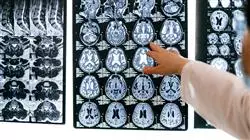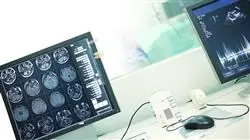University certificate
The world's largest faculty of engineering”
Introduction to the Program
Incorporate the latest biomedical engineering diagnostic techniques and procedures into your professional work thanks to esta Postgraduate diploma”

Biomedical engineering has provided numerous novel solutions and techniques for the treatment and diagnosis of different patients and pathologies. For this reason, this is one of the most important fields at present, since it offers an answer to extremely difficult challenges such as the detection of certain diseases or the monitoring of patients in a delicate clinical position. Esta Postgraduate diploma in Diagnostic Engineering and Clinical Monitoring offers the engineer the most advanced knowledge in this field, allowing them to develop a professional career in this area with all the guarantees.
They will do so thanks to the in-depth study of aspects such as nuclear medicine, ultrasound medical imaging, image processing, image-guided surgery, robotic vision, deep learning and machine learning applied to medical imaging, applications of medical hardware and software, and biosensors, among many other things.
The engineer will be able to update their knowledge on these issues thanks to TECH 100% online learning system, which will allow them to balance their studies with their professional career. Participants will also benefit from numerous multimedia teaching resources such as procedural videos, interactive summaries, case studies or master classes, always supervised by a teaching staff specialized in this area of engineering.
Learn the latest techniques in diagnosis and clinical monitoring from an engineer's point of view, delving into issues such as robotic vision and the generation of biomodels from images"
This Postgraduate diploma in Diagnostic Engineering and Clinical Monitoring contains the most complete and up-to-date educational program on the market. Its most notable features are:
- The development of case studies presented by experts in Biomedical Engineering
- The graphic, schematic, and practical contents with which they are created, provide scientific and practical information on the disciplines that are essential for professional practice
- Practical exercises where the self-assessment process can be carried out to improve learning
- Its special emphasis on innovative methodologies
- Theoretical lessons, questions to the expert, debate forums on controversial topics, and individual reflection assignments
- Content that is accessible from any fixed or portable device with an Internet connection
Diagnostic Engineering is one of the most in-demand fields today: this program gives you all the tools you need to specialize and give your career a boost"
The program includes in its teaching staff, professionals from the sector who contribute their work experience to this program, in addition to recognized specialists from leading companies and prestigious universities.
The multimedia content, developed with the latest educational technology, will provide the professional with situated and contextual learning, i.e., a simulated environment that will provide immersive training programmed to train in real situations.
This program is designed around Problem-Based Learning, whereby the professional must try to solve the different professional practice situations that arise during the academic year. For this purpose, the student will be assisted by an innovative interactive video system created by renowned and experienced experts.
Delve into Nanotechnology and medical devices and become a specialist in demand by prestigious engineering and medical services companies"

TECH has designed a 100% online teaching system to allow you to continue your professional work without interruptions, since it allows you to choose when and where to study"
Why study at TECH?
TECH is the world’s largest online university. With an impressive catalog of more than 14,000 university programs available in 11 languages, it is positioned as a leader in employability, with a 99% job placement rate. In addition, it relies on an enormous faculty of more than 6,000 professors of the highest international renown.

Study at the world's largest online university and guarantee your professional success. The future starts at TECH”
The world’s best online university according to FORBES
The prestigious Forbes magazine, specialized in business and finance, has highlighted TECH as “the world's best online university” This is what they have recently stated in an article in their digital edition in which they echo the success story of this institution, “thanks to the academic offer it provides, the selection of its teaching staff, and an innovative learning method aimed at educating the professionals of the future”
A revolutionary study method, a cutting-edge faculty and a practical focus: the key to TECH's success.
The most complete study plans on the university scene
TECH offers the most complete study plans on the university scene, with syllabuses that cover fundamental concepts and, at the same time, the main scientific advances in their specific scientific areas. In addition, these programs are continuously being updated to guarantee students the academic vanguard and the most in-demand professional skills. In this way, the university's qualifications provide its graduates with a significant advantage to propel their careers to success.
TECH offers the most comprehensive and intensive study plans on the current university scene.
A world-class teaching staff
TECH's teaching staff is made up of more than 6,000 professors with the highest international recognition. Professors, researchers and top executives of multinational companies, including Isaiah Covington, performance coach of the Boston Celtics; Magda Romanska, principal investigator at Harvard MetaLAB; Ignacio Wistumba, chairman of the department of translational molecular pathology at MD Anderson Cancer Center; and D.W. Pine, creative director of TIME magazine, among others.
Internationally renowned experts, specialized in different branches of Health, Technology, Communication and Business, form part of the TECH faculty.
A unique learning method
TECH is the first university to use Relearning in all its programs. It is the best online learning methodology, accredited with international teaching quality certifications, provided by prestigious educational agencies. In addition, this disruptive educational model is complemented with the “Case Method”, thereby setting up a unique online teaching strategy. Innovative teaching resources are also implemented, including detailed videos, infographics and interactive summaries.
TECH combines Relearning and the Case Method in all its university programs to guarantee excellent theoretical and practical learning, studying whenever and wherever you want.
The world's largest online university
TECH is the world’s largest online university. We are the largest educational institution, with the best and widest online educational catalog, one hundred percent online and covering the vast majority of areas of knowledge. We offer a large selection of our own degrees and accredited online undergraduate and postgraduate degrees. In total, more than 14,000 university degrees, in eleven different languages, make us the largest educational largest in the world.
TECH has the world's most extensive catalog of academic and official programs, available in more than 11 languages.
Google Premier Partner
The American technology giant has awarded TECH the Google Google Premier Partner badge. This award, which is only available to 3% of the world's companies, highlights the efficient, flexible and tailored experience that this university provides to students. The recognition as a Google Premier Partner not only accredits the maximum rigor, performance and investment in TECH's digital infrastructures, but also places this university as one of the world's leading technology companies.
Google has positioned TECH in the top 3% of the world's most important technology companies by awarding it its Google Premier Partner badge.
The official online university of the NBA
TECH is the official online university of the NBA. Thanks to our agreement with the biggest league in basketball, we offer our students exclusive university programs, as well as a wide variety of educational resources focused on the business of the league and other areas of the sports industry. Each program is made up of a uniquely designed syllabus and features exceptional guest hosts: professionals with a distinguished sports background who will offer their expertise on the most relevant topics.
TECH has been selected by the NBA, the world's top basketball league, as its official online university.
The top-rated university by its students
Students have positioned TECH as the world's top-rated university on the main review websites, with a highest rating of 4.9 out of 5, obtained from more than 1,000 reviews. These results consolidate TECH as the benchmark university institution at an international level, reflecting the excellence and positive impact of its educational model.” reflecting the excellence and positive impact of its educational model.”
TECH is the world’s top-rated university by its students.
Leaders in employability
TECH has managed to become the leading university in employability. 99% of its students obtain jobs in the academic field they have studied, within one year of completing any of the university's programs. A similar number achieve immediate career enhancement. All this thanks to a study methodology that bases its effectiveness on the acquisition of practical skills, which are absolutely necessary for professional development.
99% of TECH graduates find a job within a year of completing their studies.
Postgraduate Diploma in Diagnostic Engineering and Clinical Monitoring
.
Are you ready to boost your career in the medical field with advanced technical and scientific skills? With TECH Global University you can make it happen! Diagnostic Engineering and Clinical Follow-Up combines engineering knowledge with medical practice to improve disease diagnosis and monitoring processes. If you want to expand your skills in this constantly evolving field, the Postgraduate Diploma in Diagnostic Engineering and Clinical Follow-Up will give you the opportunity to acquire advanced technical and scientific skills to make a difference in the field of medicine.
Become a specialist in Clinical Data Analysis and Processing
.
In this high-quality Postgraduate Diploma, you will develop skills in clinical data analysis and processing. You will learn how to use statistical and data mining tools to extract relevant information from large clinical datasets. You will also acquire skills in artificial intelligence and machine learning to support evidence-based clinical decision making. In this program, you will explore the design and development of medical devices used in clinical diagnosis and monitoring, learn about biomedical engineering principles, biocompatibility of materials, ergonomics and safety in medical device design. You will also have the opportunity to develop prototypes and perform validation tests to ensure the efficacy and safety of devices. The Postgraduate Diploma in Diagnostic Engineering and Clinical Follow-Up provides you with the competencies necessary to excel in the medical field with advanced technical and scientific skills. Through this program, you will become familiar with cutting-edge medical technologies, gain skills in clinical data analysis and processing, and explore medical device design and development. Get ready to boost your career and contribute to the advancement of medicine through diagnostic engineering and clinical monitoring!







